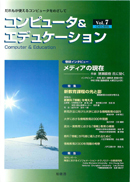Volume 7
Displaying 1-13 of 13 articles from this issue
- |<
- <
- 1
- >
- >|
Special Reports on The New Guidelines for School Curriculum -The Future of Information Education-
-
1999Volume 7 Pages 21-27
Published: November 30, 1999
Released on J-STAGE: February 03, 2015
Download PDF (1355K) -
1999Volume 7 Pages 28-33
Published: November 30, 1999
Released on J-STAGE: February 03, 2015
Download PDF (1313K) -
1999Volume 7 Pages 34-41
Published: November 30, 1999
Released on J-STAGE: February 03, 2015
Download PDF (1370K) -
1999Volume 7 Pages 42-45
Published: November 30, 1999
Released on J-STAGE: February 03, 2015
Download PDF (1308K) -
1999Volume 7 Pages 46-49
Published: November 30, 1999
Released on J-STAGE: February 03, 2015
Download PDF (1299K)
Computers and Education / Research -Examples-
-
1999Volume 7 Pages 70-74
Published: November 30, 1999
Released on J-STAGE: February 03, 2015
Download PDF (1402K)
Articles
-
1999Volume 7 Pages 84-89
Published: November 30, 1999
Released on J-STAGE: February 03, 2015
Download PDF (1628K) -
1999Volume 7 Pages 90-98
Published: November 30, 1999
Released on J-STAGE: February 03, 2015
Download PDF (1437K) -
1999Volume 7 Pages 99-105
Published: November 30, 1999
Released on J-STAGE: February 03, 2015
Download PDF (1368K) -
1999Volume 7 Pages 106-110
Published: November 30, 1999
Released on J-STAGE: February 03, 2015
Download PDF (1291K) -
1999Volume 7 Pages 111-116
Published: November 30, 1999
Released on J-STAGE: February 03, 2015
Download PDF (1419K) -
1999Volume 7 Pages 117-122
Published: November 30, 1999
Released on J-STAGE: February 03, 2015
Download PDF (1314K)
Editorial Notes
-
1999Volume 7 Pages 131
Published: November 30, 1999
Released on J-STAGE: February 03, 2015
Download PDF (1182K)
- |<
- <
- 1
- >
- >|
